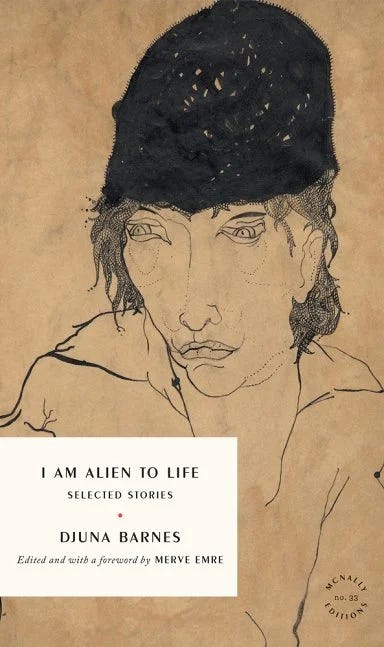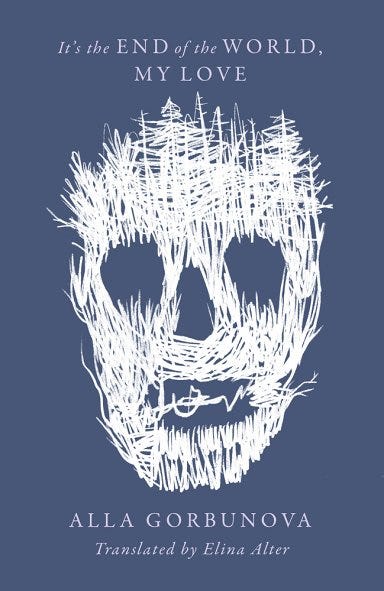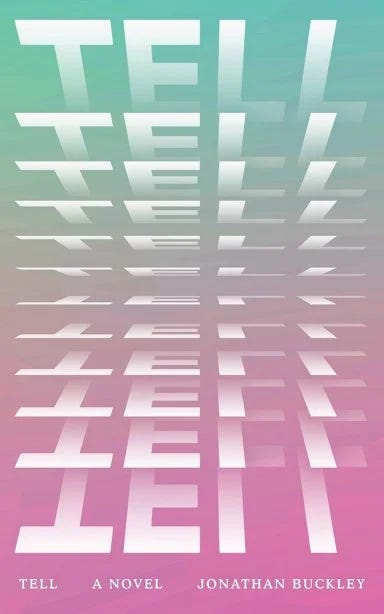Hello. I am coming out of book-review retirement and will be sharing reviews of what I read each month near the middle of the following month. Here is the first one.
I’ll be back tomorrow with the latest news. Bye!
I Am Alien to Life: Selected Stories by Djuna Barnes
At the heart of much of Djuna Barnes’s work lies some echo of original sin: with knowledge can come enlightenment, but so too can it bring devastation. It is this tension that runs through many of the stories in this collection, edited and introduced by Merve Emre. Barnes, who was born in 1892 and is most known for her modernist 1936 novel Nightwood, has a proclivity for rendering scenes of almost mundane horror. Death appears in a great number of these stories—at the beginning, middle, or end—but they resist nihilism. Instead, Barnes’s prodding of her characters’ mortality leads often to cathartic release. It’s not that they exist in a world without meaning and that all their efforts to live as they desire are futile; rather, the inevitability of death tethers them to their lives even as their alienation grows.
In “No Man’s Mare,” the second story in the collection, we encounter the character of Pauvla Agrippa just hours after her death, her “purple veins…now only a system of charts indicating the pathways where her life once flowed.” Pauvla’s sister looks resentfully at her corpse, “because it had done something to Pauvla,” yet Pauvla herself had a far different attitude toward death. She “had not wanted to live, because she did not mind death,” and she had instructed her sisters, before her untimely passing, not to have any flowers at her funeral: “‘Are ‘there any candles and flowers at a birth?’”
As the story proceeds, it is Pauvla’s loved ones who come to a point of acceptance, reconciling her death—an event which could not have been prevented nor foreseen—with the unpredictability of their natural landscape; namely, a wild horse that resists domesticating.
Not all the stories in this collection echo with quite the same timbre. Barnes is also interested in exploring familial ties—which are often weaker than blood relations may suggest—the body (with a particular fascination with teeth), and free will, with characters committing bold acts in order to prove something to themselves. They are hardly ever neatly defined people, and they are often filled with contradictions.
Largely, they contrast with the people who they come into contact with based on just how much they know—about themselves and the world around them. Some, like the elephant woman in “The Perfect Murder,” seem to know too much—“I’m vindictive because I have a passionate inferiority; most people have a submissive inferiority,” she says. “It makes all the difference in the world.” This difference, indeed, is often the determining factor in Barnes’s characters fates, but whether they act out of passion or submission, they will inevitably all end up in the same place. So is it better to know or to live in ignorance? That is a question are left to contend with for ourselves.
It’s the End of the World, My Love by Alla Gorbunova
While Barnes’s characters question whether it is better to know or be left in the dark, the protagonist of Alla Gorbunova’s novel-in-stories It’s the End of the World, My Love meditates frequently on her memories of her past. What starts as a bildungsroman walking through a girl’s childhood and adolescence in 1990s Saint Petersburg and summers at the dacha evolves as mythical elements begin to pervade the protagonist’s remembrances, leading to a section of the book—Part III: Ivan the Boar’s Knee—that walks the reader through a number of tall-tales that are often inflicted with violence, both human and supernatural. The novel ends, however, much the way that it began—though in a more complete remembrance of childhood at the dacha and Petersburg, where, “Time passed slowly; it resembled eternity.”
There is something inexplicably inviting about Gorbunova’s created world, though it is far from a friendly place. The narrator’s desires to remember, however, frequently cast it into a dream-like atmosphere that makes it emotionally sumptuous. She remember the time with her first love: “Trains, bleak light, darkness, the winter, the village, cheese, honey…And long walks around Petersburg, often eating shawarmas together, going out to clubs at night to see Irish folk rock bands.”
Amid Gorbunova’s fraught fairytales and coming-of-age scenes are moments of sharp, intellectual clarity and humor. By eleventh grade, the protagonist decides that she is ready to share her poetry with an audience, as “the nation should know its heroes.” The character’s writing is an almost religious act, as she puts pen to paper “with utmost dedication and exertion of soul, working not so much on the texts as on myself: on how I saw and felt, on my ability to catch and make manifest the ephemeral and the unfulfilled, the never-said, the not-of-this-world.”
The often-linear, yet fragmented path of the novel appears to be the execution of that goal; what begins as a striving toward remembering and a making-sense of the world via folklore and horror culminates in a Romantic vision of an idealized childhood, a Wonderland that she forgot, and tried to return to, only to understand that the vision may be even more real than she is.
What does the story of a life look like when it’s told by someone just a few steps above being a bystander? Buckley investigates this question in Tell, a short novel told entirely through extended monologues; an eccentric billionaire has gone missing, and a filmmaker is set on telling his story. And so, the household gardener shares everything that she knows and has learned about her missing employer.
This novel wasn’t quite what I expected it to be, and it’s best to not let the phrase “missing billionaire” misconstrue your assumptions about exactly what this narrative will uncover. Ultimately, it’s an account of a character who has no neat or clear resolution and leaves many open-ended questions.
Rather than unraveling a mystery, Tell dissects the eccentricities and insecurities of the mega-rich with a character portrait of a man who may be considered “one of the good ones,” given his genuine appreciation for art, his commendable treatment of his employees, and his clear heartbreak about a failed relationship. Above all, it’s a formally inventive novel that seems to squeeze the most meaning out of the things that it can’t tell us.
Far from being salacious take-down of an evil billionaire or a lurid tale of a powerful man’s many foibles, Tell is one person’s observations about a man that they knew, but didn’t really know. And the fact that they have so much to say about him—and that we (or, the filmmaker playing the role of active listener in the book) still want to listen—may say more about ourselves and the stories we want to hear than about who this person is in the first place. “It’s baffling, what goes on inside our heads,” the gardener says. “You’d think it’s straightforward. You experience something, so you should be able to describe it. It’s only something you can know. But you can’t describe it. You can’t even be sure what it is.”
Cold Enough for Snow by Jessica Au
At a slim 95 pages, Jessica Au’s novella Cold Enough for Snow deals equally in restraint and indulgence, as it meanders through a first-person recounting of a daughter’s vacation to Japan with her mother. The narrative is cut through with different memories—of a story of the mother’s childhood, which the narrator’s sister had told her at some earlier point, of the narrator’s own upbringing and of her relationship with her partner, of the narrator’s uncle and his tragic love story—but the story weighs heavily with silence and selective dialogue between mother and daughter.
It is a beautiful vacation, albeit a rainy one, during with the pair make occasional revelations to one another, yet often struggle to verbally connect. When the narrator asks her mother, in a quiet church, “what she believed about the soul,” she tells her daughter that she thinks each person to be “essentially nothing,” but growing up, she thought of herself as being in connection with the people around her, rather than an individual being, and while there was no inherent possibility for control—“The best we could do in life was to pass through it, like smoke through the branches, suffering, until we either reached a state of nothingness or else suffered elsewhere,”—there was still virtue in kindness and generosity. It is an outpouring of philosophy from the mother, who is someone who likes astrology because of the way that it “made you seem readable.” But the daughter, someone believed in “will and perseverance,” is unable to agree with her. Worse, “she could not even pretend,” and instead tells her mom that visiting hours for the church are almost up and it is time for them to go.
There is some pain in these small moments of disconnection, and they reflect the cultural and generational divide between the mother, who grew up in Hong Kong, and the daughter, who was raised in Australia.
Stylistically, there are many lovely moments and images in these pages, but most striking are the moments of tension and resolution—the awkwardness that can invariably arise on a vacation with any loved one paired with the genuine desire to connect.
We do find that both figures are able to find ways to support one another, though by the end, I was curious how much the narrator’s retelling of the story was “real,” and how much of it was her attempt to reconcile the subtle estrangement she sometimes felt. Writing, she tells her mother, is not to be trusted. “It is the only way that one could go back and change the past, to make things not as they were, but as we wished they had been, or rather as we saw it.” ▲







